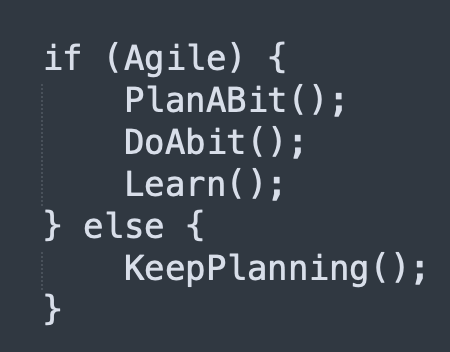Certified Scrum Developer® (CSD) Course
Scrum/Agile developers turn ideas into value. Let's help each other get even better at it and have fun doing it.
Duration: 2 days or 3 days, or custom. Other roles welcome. (coding optional)
Outline - Learning Objectives
Why Choose This Course & Instructor
More Insights & Options
This course directly addresses the required learning objectives from the Scrum Alliance. Plus, it then adds multiple perspectives, principles, & practices per topic, to empower you with more insight & options for impact.
"Scrum is supposed to be fast, easy, and fun. If it's slow, hard, and painful, you're doing it wrong."-- Jeff Sutherland, Co-Creator of Scrum
Video Preview of Training (1:14)
Knowledgeable, Patient, & Caring
Michael Kelley Harris
Agile Software Engineer + Coach + Trainer
20+ Agile years of humbling wins and hard-won lessons from startups to the world's largest organizations, plus venture capital and private equity. I'm here to help you grow your Agile influence, impact, & opportunities, and your organization's culture for ongoing innovation. I emphasize key principles because they are the most widely applicable and last the longest. I'm pragmatic vs dogmatic. I have extra experience in Agile engineering practices (XP), plus Lean Startup, & Design Thinking. HW/SW systems. More ... 650-485-1203
Testimonials
"... engaged, valuable, and actionable...", "...wonderful experience...", "...awesome course...", "...expert and deep caring...", ".. one of the best trainers I've encountered...", "...interactive & inclusive..."
"What a fantastic two days in CSD with a great instructor and some wonderful people. Thank you so much Michael Kelley Harris for really making this program/course for all!" - Shannon Larsen, Curriculum Designer at Scrum Alliance
"The team loved your course. They shared that in the moment it was a lot to take in, but saw the power in our shift." -- Scrum Master for a team taking a Certified Scrum Developer (CSD) course
"I appreciated how interactive the class was, and I appreciate your willingness to answer questions, even ones not directly covered by the training." - Jack, CSD class
"I really enjoyed this course! Though I am not a software developer, I was able to participate in all activities and was also provided options for non-software activities. It was a wonderful two days and the instructor Michael Kelley Harris did a great job accommodating all..." - CSD class attendee
Full Testimonials

Prerequisites
None officially. For preperation, we recommend that you read The Scrum Guide, by the creators of Scrum. It's a brief 13 pages and will serve you well in the class, and beyond. Scrum Foundations learning objectives are corequisites. We'll study them in the CSD class. You don't need to be a coder for this class. We will do/demo some coding exercises and you'll be able to follow along, even if your head spins a bit.
Who Should Attend
Developers, Product Owners, Scrum Masters, Leaders, Managers, engineering, test, support, and more.
The CSD course focuses on the perspective of people doing the work of turning ideas into valuable products & services. The course has two main topics, Scrum Foundations plus Agile/Scrum engineering practices associated with software. The ideas are general enough to apply to non software contexts, including infrastruture, hardware, and more. Scrum Masters would benefit from taking the CSD to support their teams with extra options & perspective.
Anyone new to the agile way of work will find value from the concepts covered in the CSD course. Scrum is applicable across industries and potentially cross-functional teams, so marketers, data scientists, HR representatives, and other professionals looking for a better way to solve complex problems are encouraged to attend."
Benefits
Class Logistics
- The class is typically two full days of engagement, whether in-person or online.
- Approximately a week before the class, I'll email specific details on the class. Typical details: csd_training_prep_post.html
- For online courses, we typically use video and online collaboration tools. e.g. Zoom video and Google Docs or similar.
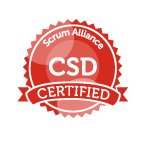
A Bit of Coding
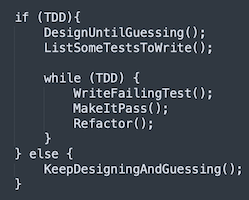
For coding demos & exercises, we'll likely use a mix of Python, C/C++, Javascript, java, & C#. It would be good to be able to edit/build/lint/run the very basics of those languages, but it's not critical. We'll use a mix of on-line IDEs (e.g. cyber-dojo) and simple WSYWIG editors and the command lide. e.g. Sublime Text, TextMate, Nodepad++
We'll do mostly pairing & mobbing to share ideas and tool support. I'll demo some more sophisticated tools and we may mob to use those tools.
Simple Refund & Cancelation Policy
If you decide not to attend/finish the class for any reason, let me know and I'll help you find an alternative class, or give you a full refund. You have up to the end of the 2nd day to tell me. If we need to cancel a class, we'll give you the choice of a full refund or another class.
Class Calendar
Extra Optional Reading
In case you want to read more about the course, instructor, optional topics
How Is This Class Different?
First off, all CSD courses must meet the same learning objectives required by the Scrum Alliance. The foundational learning objectives are based on the latest Scrum Guide. The instructors have lots of latitude about how the learning objectives are met. I add multiple perspectives, principles, & practices per topic. This reinforces the deeper principles & patterns, giving you more options in more situations.
Many courses present Scrum as a very different, and new way, to do things, as if "waterfall" had previously been used for everything. I help you connect to examples in your life and work where you may be already using the Agile ideas naturally. This revelation may help you tell a compelling history of your Agile thinking. We'll also discuss some examples of Agile thinking and building long before and before Scrum went public in 1995 and the Agile Manifesto went public in 2001
While many courses give you one main example way to apply a principle or practice. I strive to give you multiple ways so that you can see the deeper pattern and adapt to more diverse situations and constraints. We directly hit each topic from multiple angles, the official word, what we've seen in the wild, the deeper "why" it matters, alternative views, trade-offs, balance, and how you can recognize if something is off, and ways to solve it.
We will do some simulations/games and watch some relevant videos. The class is mainly a collaborative discussion. (somewhat Socratic style or coaching style) The format of this class is best for people who want to engage in an exploration & discussion of these topics, both for discovery and as practice for the discussions you'll later have in your real teams & organizations, and interviews.
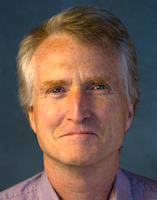
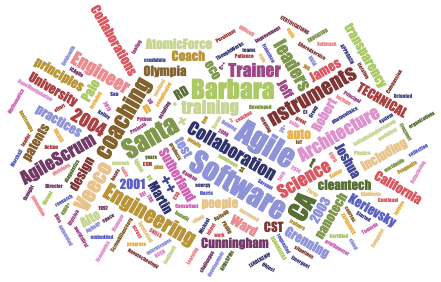
How Is This Instructor Different?
First off, all the CSD instructors I've met are good. All CSD instructors need to be Scrum Alliance approved by the Scrum Alliance. I have done lots of engineering, R&D, and entrepreneurial adventures. I've helped people from the C code to the C suite, plus helping venture capital and private equity firms.
I've been fortunate to learn & work with some of the premier technical agilists including Ward Cunninghan, Ron Jeffries, Robert Martin, Joshua Keriskey, and more.
I've also gradually attended 12+ more CSM, CSPO, & CSD courses from top Scrum teachers including four from the creator of Scrum Jeff Sutherland, plus Jeff McKenna, Roger Brown, Bryan Stallings, Rob Myers, Paul Moore, and more. You get the benefit of my diverse portfolio of perspectives, practices, & solutions.As your instructor, I focus on your agile/Scrum journey, from where you are to where you want to go. I look forward to meeting you and helping you move forward in the direction of your choice.
My personal passions include running, growing food, writing songs, and using Agile ideas for environmental sustainability innovation.
Other Topics
As time permits, we can explore whatever related Agile/Scrum topics you like, or practice more to integrate the fundamentals. Having your classmates & instructor to brainstorm with may lead to some extra insights to help your situation.
What is Scrum?
Scrum is a lightweight framework for developing products, in the context of change and uncertainty. It is very popular in innovative software organizations. But it can be applied to any industry. See the Scrum Guide and the Scrum Alliance's site for summary info on Scrum Master certification. Return here to take the course.
Why Get Certified
While some people take the course just for learning and don't want the certification, many people do want the certification. Here are some reasons why:


